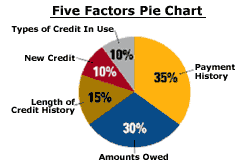In this credit crunch, lending is becoming much more credit-driven and minimum required credit scores of 680+ or 700+ are the norm. Your goal should be to get in the 700 range, but the higher the better. (Credit scores range from 350-850, 850 being the highest one can get).
It’s good to know what makes up a credit score so that you can know where to concentrate your efforts, so here’s the scoop:

1. Payment History (35% of credit score’s weight)
- Make timely payments! The fewer “lates”, judgments, liens or collections, the better.
- Recent derogatory items will hurt your score much more than older ones (being late 1 month ago versus 24 months ago).
- The longer a payment is past due, the more it will negatively impact your score (i.e. being 60 or 90 days past due is much worse than being 30 days past due).
2. Amounts Owed (30% of credit score’s weight)
- It’s better to keep balances low on many credit cards as opposed to high balances on 1 or 2 cards. An excellent rule of thumb is to keep your balance at or below 30% of your credit limit. (Some people say 50% and below is sufficient, but 30% is the ideal figure). ex. If your credit limit is $10,000 don’t charge more than $3,000 on the card.
3. Length of Credit History (15% of credit score’s weight)
- The longer you’ve had an account open (as long as you’ve made good, timely payments), the more time you’ve had to establish good credit and to show that you’re a solid candidate for borrowing. The idea behind this is that your past payment habits will reflect your future payment habits.
- Closing old, seasoned accounts will negatively impact your score (that credit card you got on your 18th birthday can serve you extremely well!).
4. Types of Credit in Use (10% of credit score’s weight)
- If at all possible, stay away from finance company accounts (for example, the “great deal” the furniture company is giving you – “no interest payments until January 2010!”). It’s interpreted as if you can’t qualify for other types of credit.
5. New Credit (10% of credit score’s weight)
- Looking for new credit can indicate higher risk.
- Inquiries (getting your credit report pulled) can negatively impact your score; however, multiple inquiries for mortgages within a 21 day time period are counted just as a single inquiry on your credit report.
If you would like a more detailed brochure on credit reporting, let me know and I’ll send it to you. I’m also always available for credit report consultations.


